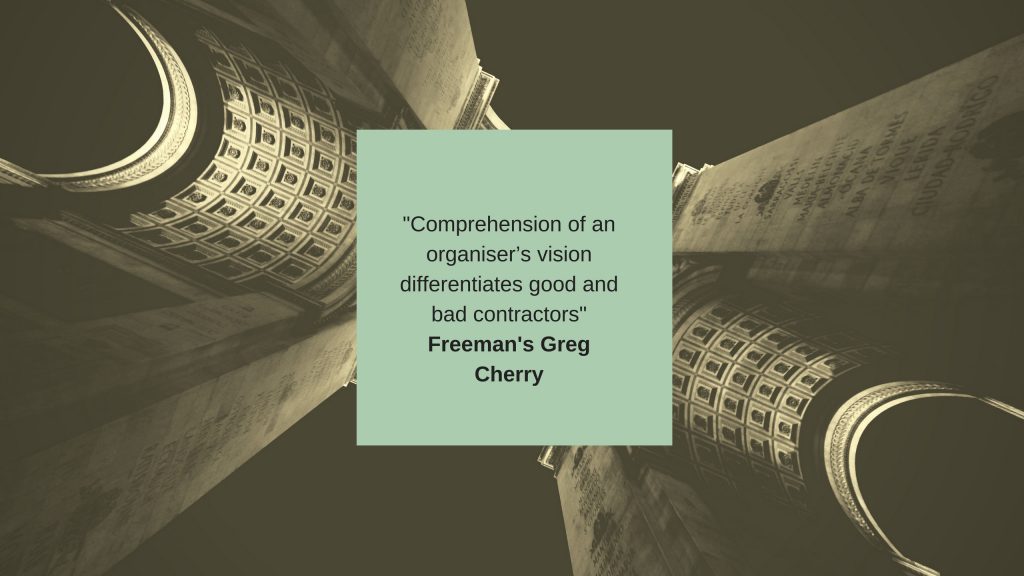The ability to create an appealing and appropriate backdrop to an event is core to the success of any organiser. Clarity of vision when it comes to design, must be understood by the people organisers employ to create the event. But if contractors must be mindful of the organiser’s vision, should they also be sympathetic to the way the event organiser’s business runs, and the markets in which it operates, if they are to create the event effectively?
Put simply by Freeman’s Greg Cherry, “A contractor is an entity that should be a partner to the organiser. Gone are the days where a contractor is simply someone who comes and sets up according to the organiser’s plans and then leaves, only to return at dismantling time,” says Cherry.
Business events cater for markets that fluctuate on a daily basis and a contractor needs to be prepared to adapt accordingly. There are, after all, many tiers of client relation in the business events game; speakers, sponsors, venues, delegates, visitors and exhibitors.
Understanding markets and immersing oneself in the business of their clients – and their clients’ clients – will enable a contractor to understand how the market in which they are involved is changing. This in turn helps them adapt their proposition to the organiser.
Take, for example, the rubber technology event GRTE 2016, a two-day conference and exhibition organised by TechnoBiz and the China United Rubber Corporation. It is one of Thailand’s hottest new business events, nominated for several marketing awards and the brainchild of Peram Prasada Rao.
The show, he explains, has been created with thematic resemblance to a shopping mall. People can attend to hang out, or to meet and exchange knowledge, or to buy. it hopes to cover all aspects for every stakeholder, technical and non-technical staff, industry observers, buyers and sellers.
That the event has been built around educating the industry, rather than transactions, is beyond doubt. In 2012 there were 20 educational courses; this year’s event had 120. Additionally, it included a research fair, a consultant hub and a knowledge test element; an examination to promote analytical thought in the industry.
But no matter the number of speakers, the memorability of the event hinged on it being created in the vision of TechnoBiz.
“We wanted to create this show for the employees of the companies that attend. Competent people are only competent when they have been assessed. Any industry develops because of people’s special efforts in developing solutions. It is not just the company. It is the individuals,” explains Rao. Knowing the revised vision Rao has for the event is therefore at the core of his contractors’ successful execution.
Cherry says comprehension of an organiser’s vision differentiates good and bad contractors, certainly in the eyes of the organiser. “This has changed through contractors becoming more aware of the experience they can offer their clients, all the while being pushed to deliver value with parameters that might not be changing at the same rate.
“Above all, though, and to be enabled to do this, an organiser must be fully immersed in the industries they serve and need to create communities within these wider markets,” says Cherry. “Bringing these communities together and interacting with them not for just three days at a show but on a 365, 24/7 level means the organiser will be able to react to changes in the marketplace. This can often be the difference between success and failure.”
Cherry echoes Rao when he points out the visitor is the one that dictates not only the direction of the market, but by extension the event itself. “The fact is that the most important party at an event is the visitor. After all, this is the community that shapes change within the industry,” he says, adding that any organiser not reacting to this will be “doomed”, in his words.
It is also the reason we value the input and execution of the contractor so highly. Make your event stand out due to the environment you’ve created, or an atmosphere conducive to interaction and the exchange of knowledge, you are likely to find attendees return the following year.
Plan for the long-term
Anyone new to the MICE industry has to understand that contracting for organisers can be equally a demanding and rewarding process. Always approach the organiser as a prospective partner with a view to cultivating a long partnership.
“Health and safety, creativity, technology and delivery with excellence should all be considered as essential to being a general service contractor,” says Cherry. “Also remember that a show is all that the organiser – and in particular the operations teams – have been striving to deliver for, usually, a whole year. It is their everything. For a contractor it may be one of 200 events that you deliver.”
This is similar around the world, although lead times and labour methods may be very different from country to country. As Cherry points out, emerging markets, with the help of global contractors and driven by organisers, have helped focus on health and safety around venues and in countries that were not previously used to holding large international congresses.
However, regardless of the industry or the location, the atmosphere and the sense of occasion is key to visitor retention. The professional congress organiser, together with high quality contractors, is capable of building much more than a stage.







